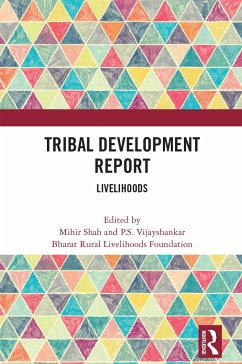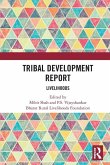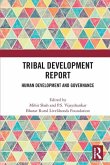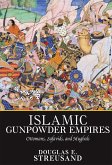Tribal Development Report
Livelihoods
Herausgeber: Shah, Mihir; Foundation, Bharat Rural Livelihoods; Vijayshankar, P. S.
Tribal Development Report
Livelihoods
Herausgeber: Shah, Mihir; Foundation, Bharat Rural Livelihoods; Vijayshankar, P. S.
- Gebundenes Buch
- Merkliste
- Auf die Merkliste
- Bewerten Bewerten
- Teilen
- Produkt teilen
- Produkterinnerung
- Produkterinnerung
This book sheds light on the status of tribal communities in Central India with respect to livelihoods, agriculture, natural resources, economy, and migration.
Andere Kunden interessierten sich auch für
![Oman and Muscat Oman and Muscat]() Patricia RissoOman and Muscat60,99 €
Patricia RissoOman and Muscat60,99 €![In the Traces of our Name In the Traces of our Name]() Juan Eduardo TesoneIn the Traces of our Name55,99 €
Juan Eduardo TesoneIn the Traces of our Name55,99 €![Order and Rebellion in Tribal Africa Order and Rebellion in Tribal Africa]() Max GluckmanOrder and Rebellion in Tribal Africa70,99 €
Max GluckmanOrder and Rebellion in Tribal Africa70,99 €![Tribal Development Report Tribal Development Report]() Tribal Development Report44,99 €
Tribal Development Report44,99 €![Tribal Development Report Tribal Development Report]() Tribal Development Report44,99 €
Tribal Development Report44,99 €![Islamic Gunpowder Empires Islamic Gunpowder Empires]() Douglas E. StreusandIslamic Gunpowder Empires80,99 €
Douglas E. StreusandIslamic Gunpowder Empires80,99 €![Encounters with the Invisible Encounters with the Invisible]() Encounters with the Invisible43,99 €
Encounters with the Invisible43,99 €-
-
-
This book sheds light on the status of tribal communities in Central India with respect to livelihoods, agriculture, natural resources, economy, and migration.
Hinweis: Dieser Artikel kann nur an eine deutsche Lieferadresse ausgeliefert werden.
Hinweis: Dieser Artikel kann nur an eine deutsche Lieferadresse ausgeliefert werden.
Produktdetails
- Produktdetails
- Verlag: Taylor & Francis Ltd
- Seitenzahl: 338
- Erscheinungstermin: 30. September 2022
- Englisch
- Abmessung: 240mm x 161mm x 23mm
- Gewicht: 608g
- ISBN-13: 9780367724726
- ISBN-10: 0367724723
- Artikelnr.: 63396231
- Herstellerkennzeichnung
- Libri GmbH
- Europaallee 1
- 36244 Bad Hersfeld
- gpsr@libri.de
- Verlag: Taylor & Francis Ltd
- Seitenzahl: 338
- Erscheinungstermin: 30. September 2022
- Englisch
- Abmessung: 240mm x 161mm x 23mm
- Gewicht: 608g
- ISBN-13: 9780367724726
- ISBN-10: 0367724723
- Artikelnr.: 63396231
- Herstellerkennzeichnung
- Libri GmbH
- Europaallee 1
- 36244 Bad Hersfeld
- gpsr@libri.de
Mihir Shah has co-founded the Samaj Pragati Sahayog in 1990 and has spent the past three decades living and working in remote, central tribal India, forging a new paradigm of inclusive and sustainable development. From 2009 to 2014, he was Member, Planning Commission, Government of India, chiefly responsible for drafting the paradigm shift in water enunciated in the 12th Five Year Plan, as also a makeover of MGNREGA, with a renewed emphasis on rural livelihoods, based on construction of productive assets. In 2019, the Government of India invited him to chair a Committee to draft the new National Water Policy. P.S. Vijayshankar is co-founder of Samaj Pragati Sahayog, one of the largest civil society initiatives in water and agriculture based in Central India. He has lived and worked among the tribal communities for over 30 years. He was a Visiting Scholar at the Centre for Advanced Study of India (CASI), University of Pennsylvania, Philadelphia, USA, (2011) and is currently Adjunct Faculty at Centre for Public Affairs and Critical Theory (C-PACT), Shiv Nadar University, Delhi. He is the Founding Director of Nature Positive Farming and Wholesome Foods Foundation (N+3F), a company engaged in the promotion of sustainable agriculture. Bharat Rural Livelihoods Foundation (BRLF: http://brlf.in) was set up by the Ministry of Rural Development, Government of India as an independent society with the aim of upscaling civil society action in partnership with government, with a focus on the Central Indian tribal region. Together with its civil society partners and several state governments, BRLF is working with hundreds of thousands of, mostly tribal, households, to eliminate poverty and deprivation, develop climate resilient sustainable livelihoods, create empowered community institutions led by women, and build capacities and tribal leadership at the grassroots. This Tribal Development Report has been anchored by BRLF's research vertical.
Introduction 1. Macro-Economic Situation of Scheduled Tribes in India with
a Focus on Central Indian Tribal Belt 2. Tribal Agriculture: Context and
Challenges 3. Managing Groundwater Across the Diverse Central Indian
Drylands: The Need For A Nuanced Approach 4. Urban Underclasses and
Industrial Serfs of Transforming Tribal Central India: Survival Realities
of Footloose Tribal Migrants 5. Improving Adivasi Access to Energy and
Infrastructure 6. Land and Tribal Human Development: Part I 7. Land and
Tribal Human Development: Part II
a Focus on Central Indian Tribal Belt 2. Tribal Agriculture: Context and
Challenges 3. Managing Groundwater Across the Diverse Central Indian
Drylands: The Need For A Nuanced Approach 4. Urban Underclasses and
Industrial Serfs of Transforming Tribal Central India: Survival Realities
of Footloose Tribal Migrants 5. Improving Adivasi Access to Energy and
Infrastructure 6. Land and Tribal Human Development: Part I 7. Land and
Tribal Human Development: Part II
Introduction 1. Macro-Economic Situation of Scheduled Tribes in India with
a Focus on Central Indian Tribal Belt 2. Tribal Agriculture: Context and
Challenges 3. Managing Groundwater Across the Diverse Central Indian
Drylands: The Need For A Nuanced Approach 4. Urban Underclasses and
Industrial Serfs of Transforming Tribal Central India: Survival Realities
of Footloose Tribal Migrants 5. Improving Adivasi Access to Energy and
Infrastructure 6. Land and Tribal Human Development: Part I 7. Land and
Tribal Human Development: Part II
a Focus on Central Indian Tribal Belt 2. Tribal Agriculture: Context and
Challenges 3. Managing Groundwater Across the Diverse Central Indian
Drylands: The Need For A Nuanced Approach 4. Urban Underclasses and
Industrial Serfs of Transforming Tribal Central India: Survival Realities
of Footloose Tribal Migrants 5. Improving Adivasi Access to Energy and
Infrastructure 6. Land and Tribal Human Development: Part I 7. Land and
Tribal Human Development: Part II








